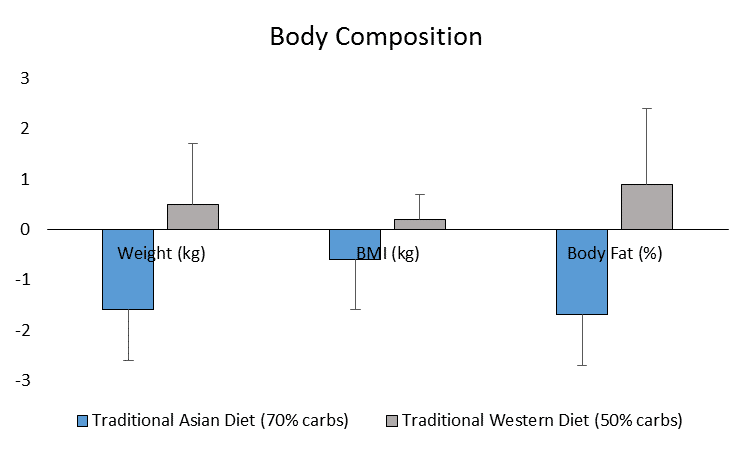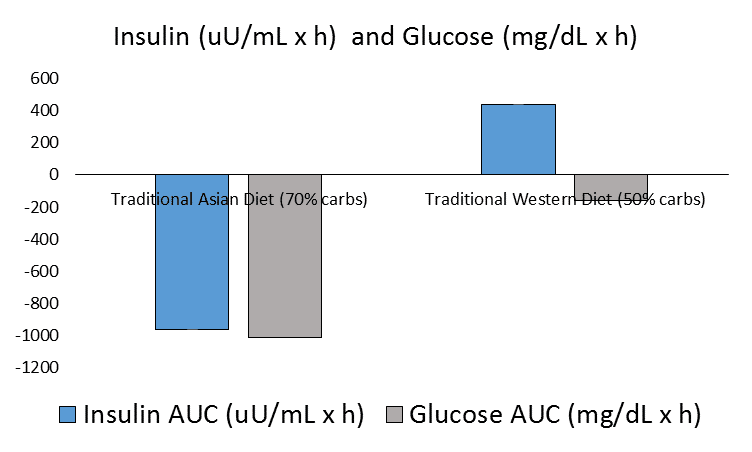Low carb diets are the shizzzz for improving insulin sensitivity, at least that is what is marketed to the masses. Perhaps the carbohydrate content of those diets is not the single most important thing. This post will suggest that, again carbohydrates themselves are not the evil they are portrayed to be and you can improve your insulin sensitivity on a high carb diet.
In a recent study, researchers took a group of people and compared a high-carb diet to a traditional western diet and looked at weight loss and insulin senstivity
Participants
A total of 40 participants with mean age around 34 completed the study. The study was more female than male, and participants had a mean BMI < 25. So these were what ought to be considered “normal” weight individuals
The Study
There were 4 study visits:
- Baseline Screening
- Before the first 8 weeks of the traditional Asian diet (TAD)
- After the first 8 weeks of the TAD
- After the last 8 weeks of the TAD or the traditional western diet (TWD)
Diets
A 10-day menu cycle that reflected the nutrition composition of a high-carb, traditional Asian diet (TAD) and a still high, but relative lower carb traditional western diet (TWD). The TAD consisted of 70% energy from carbohydrate, 15% from protein, 15% from fat, and 15 g fiber/1,000 kcal; TWD contained 50% energy from carbohydrate, 16% from protein, 34% from fat, and 6 g fiber/ 1,000 kcal
“To ensure the outcomes were not confounded by the effects of weight change, all participants were weighed every two weeks; the amount of food provided were adjusted as necessary by the RD to ensure that participants’ weight was maintained within 2 kg from their weight at the start of the study.
The RD trained the professional culinary staff to prepare the recipes including properly measuring and weighing the food to ensure standardized measurement and food preparation. A delivery company was contracted to deliver the food to participants every 2-3 days for freshness and quality. Three meals and one snack were included each day. Daily weighed food records were provided to each participant. Participants were asked to record the percentage of consumption of the food provided daily. Participants were instructed to consume only foods provided through the study, and limit eating out, drinking alcohol or eating high fat meals. Participants were asked to record all the non-study provided food that they consumed during the 16-week study.”
The Results
40 people completed the study. (7 in control and 33 in the intervention). For both intervention and control groups, 90% of the food provided was consumed. Based on the IPAQ 7-day short form, no significant changes in activity levels were found in AA and CA in both control and intervention groups throughout the study.
The TAD group (those who consumed higher carbohydrate intake lost roughly 4 pounds while those on the traditional western diet gained just under 2 pounds. The calorie difference between the TAD, TWD, and control group was pretty negligible, especially when you look at the variance.

Interestingly, despite being higher in carbohydrates the TAD group had lower Insulin AUC than the TWD. Additionally, the TAD had lower Glucose AUC (although not statistically significant p=0.110) than the TWD.

Interactions with Race?
Now I know a lot of people are going to make the following claim, “well people of Asian descent are wired differently and respond differently”. Well the authors broke the cohort into Caucasian Americans and Asian Americans and showed that the improvements in insulin levels and glucose did not differ by race(yes, I know not statistically significant due to high variation in the data).
Now what still remains an unanswered question is, why were there improvements in HOMA-IR in the Asian American, but no significant improvements in the Caucasian Americans? My initial guess is that as we have a smaller sample size when breaking the cohort down the data loses our statistical significance.
What This Means?
Now before the masses descend and attempt to poke holes in this study (yes there are flaws like any paper), there are some important take-away points.
1) It is possible for already fairly lean people to lose weight consuming a high carbohydrate diet.
2) It is possible to improve reduce insulin load in individuals with a higher carbohydrate diet.
3) It looks like the traditional western diet, once again, is pretty poor and that the carbohydrate content of it may not be main driving factor of the health detriment inherent in the dietary pattern.
It is likely there are synergistic factors of the western diet conspiring to produce the metabolically unhealthy phenotype we witness: over-consumption of nutrient deficient refined sugars, reliance on processed and fatty meats, synthetic oils, sodium, and hyper-palatable foods. Thus, a diet like the TAD in this study which reduces many of these features simultaneously may contribute to an overall more healthful diet.
Are high-carb, traditional Asian diets the sole answer? No, likely not. Could they be applied as a tool for certain people in improving insulin sensitivity in certain circumstances? I would argue they could indeed.

